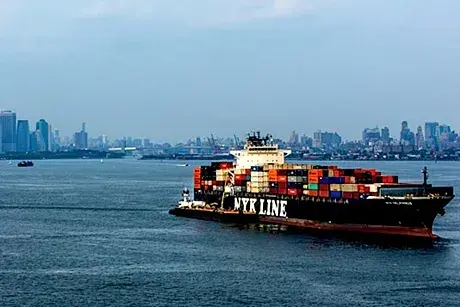A 'Busy, Busy Time’ in Admiralty Law
Are admiralty and maritime law dying fields in the 21st century? Lawyers who practice in the field say no way.

The suggestion that, in the 21st century, admiralty and maritime law are shrinking fields is roundly rejected by most lawyers who practice in those areas, RWU Law alumni very much included.
[See main story, "Inside RWU Law's Small 'Admiralty Empire."]
Adam Deitz ’14, an associate at Freehill Hogan & Mahar in Manhattan, allowed that there has been a consolidation of work within a smaller number of firms, but denies it’s exclusive to his specialty.
“Sure, in the 70s and 80s, admiralty was a much bigger issue with a lot more lawyers,” Deitz said. “But then again, in the 70s and 80s it took a lot more lawyers to do anything. The legal industry in general is consolidating.”
That’s also because many of the major issues of that drove admiralty law in those days have since become settled law, he added.
“Forty years ago, for example, when containerization [freight transport using shipping containers] was just becoming a thing, you had a lot of legal issues to settle,” Deitz said. “But now there’s just not as much to talk about in cargo cases as there used to be. So you can have fewer law firms and fewer lawyers spending a smaller amount of time on it because the issues are settled. Everyone knows what a case is going to go for.”
“It’s an esoteric field, something you have to seek out. But if you do seek it out, RWU Law has become a respected name that carries some weight.”
~ Bill Burnham ’16, Nicoletti Hornig & Sweeney.
At the same time, however, entirely new issues have arisen, noted Kirby Aarsheim ’10, a partner with Farrell Smith O’Connell LLP in Salem, Mass., and a member of the national Maritime Law Association's board of directors.
“The industry isn’t dying, it’s just changing,” she said. “Technology is creating very exciting opportunities for younger practitioners who are well-versed in areas like cybersecurity. My practice is very busy.”
A 'Diverse and Fertile' Specialty
And admiralty firms keep on hiring. (Deitz noted that fellow alum Katie O’Brien ’18 just joined his firm this month.)
“It’s a busy, busy time,” said Brody Karn ’19, who recently joined Hill Rivkins LLP in New York City. “When I first decided that I wanted to go into maritime and admiralty practice, people would say, ‘Well, ships just don’t crash into each other like they used to.’ But it’s amazing, with the vast breadth and scope of what you can do in this field of law, just how busy we can be. And we do still deal with many large cargo losses here. It requires both a lot of behind-the-scenes work, and also very zealous advocacy on behalf of our clients, because there’s just so much at stake in these maritime cases.”
“I didn’t realize how diverse and fertile the field was at first,” agreed Bill Burnham ’16, an associate with the Wall Street firm of Nicoletti Hornig & Sweeney. “Personally, what I do can range from your run-of-the-mill, garden-variety premises liability, slip-and-fall that just happens to occur on a party boat or a dock in a marina, and which involves a marine insurance policy, right on up to complex, esoteric stuff involving the doctrine of uberrimae fidei and very marine-specific situations.”
And it’s still a realistic career choice for those willing to make the effort.
“It’s an esoteric field, something you have to seek out,” said Burnham. “But if you do seek it out, RWU Law has become a respected name that carries some weight.”
And the Boston-based Aarsheim, who sits on the MLA board with Brian Eisenhower ’09, a partner at Hill Rivkins, stresses that New York is not the only career option in the field.
“It’s just a different kind of practice,” she said. “In Massachusetts, I represent fishing vessel owners. In New York, it’s more marine commercial litigation, representing larger maritime corporations. Here it’s more marina-type cases and smaller vessel owners; fishing vessels, for sure, and a fair number of recreational vessels, too. That part of the practice is very different from New York.”
And because the concentration of cases is less dense, a broader palette of expertise is required.
“I need to know all the different areas of maritime law – salvage, marine insurance, financing, personal injury, collision, fisheries, regulatory aspects; and all different vessels, as well – sailing, fishing, cargo, recreational," Aarsheim said. "In a way, that’s a big benefit.”
“New York certainly has a bigger admiralty bar than Boston,” agreed Robert Falvey ’98, a marine insurance legal specialist with Falvey Insurance Group in North Kingstown, R.I., who teaches at RWU Law as an adjunct. “But Roger Williams has a presence in Boston, as we do in Newport. We have people everywhere.”
“It’s probably not ever going to be a growth field,” noted Eisenhower. “But that said, there are employment opportunities, especially if you’re patient. It took me a while to find a position – it was about a year after graduation before I landed my first job in the maritime field.”
For his part, RWU Law Professor Jonathan Gutoff feels certain that admiralty and maritime lawyers will be needed for a long time to come.
“It’s a consistent practice,” Gutoff said. “Shipping is not going anywhere. People will always have to move stuff. But yes, it’s a relatively small bar. And so the fact that we’ve had regular placements over the past few years in New York is pretty amazing, particularly given the size of our graduating class – we don’t graduate nearly as many people as Tulane does, or as Fordham does for that matter."
He smiles. "From that, I gather that we must be pretty good."
